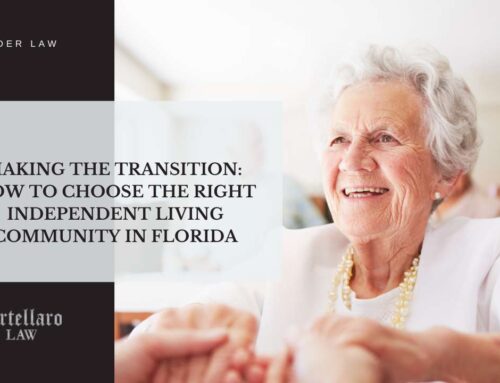Aging in place has been gaining popularity in recent decades. As older people who have been active and independent throughout their lives often resist the structure and restrictions of long-term care facilities, many prefer to remain in their own homes. However, this is not always the best option. When you visit your aging parent, stay alert to signs that they may need direct care or supervision. The condition of their home, personal appearance, and personality changes are some examples. Consider the likelihood that your parent should not be living alone.
In the past, the most common arrangement was for elderly parents to live with their adult-aged children. In some cases, it worked quite well, but in other cases, it did not. There are some important factors to think about if you are considering a multi-generational household. Whether you believe caring for aging parents is your responsibility or an act of love, or you are being pressured, make sure it is the right choice for your entire family.
Be Realistic On What It Takes To Care For An Aging Parent
First, think realistically about your other responsibilities. As most adults today have jobs, ask yourself how caring for your parent would affect your job. If your parent needs round-the-clock supervision or has a health issue that requires monitoring, you would not be able to devote adequate time and attention to both your parent and your job. If you want Mom or Dad to live with you, though, there is an option. You can find a senior home care agency in your area. Whether your parent needs health care services or only companionship, you can hire an excellent caregiver who has appropriate qualifications.
Second, be sensible when it comes to yourself and other members of your family. Too often, adult-aged children who care for aging parents have little time left for themselves, their spouses, and their own children. Not only do you need time to rest, relax, and enjoy social activities, but you also need to devote time to your spouse and kids. Unless your aging parent is overly demanding, senior home care can be helpful. You do not need to feel guilty over asking for help. Many families find home care is the best way to balance their lives.
Third, be realistic about your parent’s needs. If your Mom or Dad has a serious medical condition, or their mental health is deteriorating, it is unwise to try to deal with it on your own. Most home care agencies have caregivers who are qualified to provide skilled nursing services. You can avoid unnecessary problems, and may even prevent a tragedy, by hiring a professional caregiver.
A fourth factor is your general lifestyle. Everyone in your household should know that moving your elderly parent in will result in changes. A good approach is to get your spouse and kids together for a family meeting. Talk about issues that may occur and allow each person to have input. From smoking to entertaining, know how your family will be affected by your parent’s presence. If the changes will not be extremely disruptive or inconvenient to your family, have another meeting and include your parent. While there will certainly be adjustments, compatible lifestyles have the best results.
Important Points To Consider In A Multi-Generational Household
However, there is an important point to keep in mind. Multi-generational households work best when everyone knows they are part of the family. Your spouse and children should not feel like they are simply tolerating your parent, and your parent should not feel left out. Whenever possible, include your parent in activities and your everyday lives.
There are numerous benefits to this approach. In addition to feeling like a welcome member of the family, it is also good for your parent’s physical and mental health. From playing games together to listening to stories about the past, it is a nice way for your children to develop a special bond with Grandma or Grandpa.
Fifth, acknowledge that even the best arrangement can have complications and that your new living arrangements cannot last forever. At some point, you may need to place your parent in a long-term care facility, but there may also be issues with finances and end-of-life decisions that must be addressed sooner. When you are providing elder home care yourself, a smart step to take is to consult with an elder law attorney who has the experience and resources to deal with situations that aging adults and their families will face.
All you need to do is call to request a complimentary consultation. You can have the answers you need for peace of mind. With the proper considerations and plan in place, caring for your aging parent can be a wonderful experience for your entire family.





